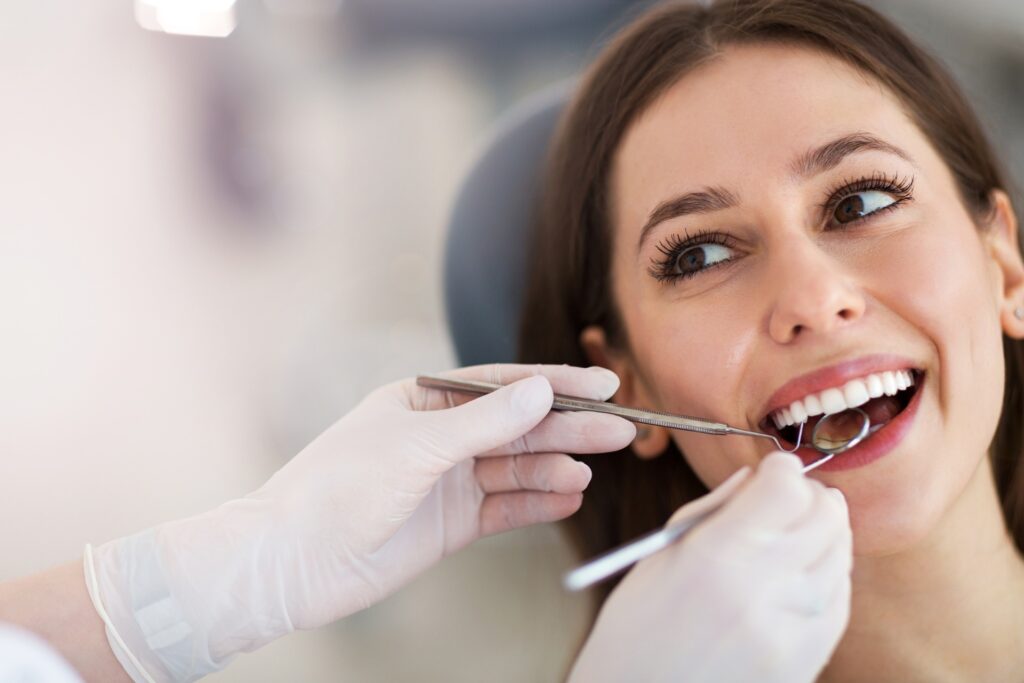Maintaining good oral health is essential for overall well-being, and regular dental exams play a crucial role in this process. While daily brushing and flossing are vital for keeping teeth and gums healthy, regular visits to the dentist are equally important. These exams are more than just routine check-ups; they are comprehensive evaluations that can detect potential issues before they become serious problems. In this blog, we will explore the importance of regular dental exams, their benefits, what to expect during an exam, and how they contribute to long-term oral health.
Early Detection of Dental Problems
One of the primary reasons for regular dental exams is the early detection of dental problems. Many dental issues, such as cavities, gum disease, and oral cancer, can develop without causing any noticeable symptoms in their initial stages. By the time pain or discomfort is felt, the condition might have progressed significantly, requiring more extensive and costly treatments.
During a dental exam, the dentist thoroughly examines the teeth, gums, and other oral tissues, using tools like X-rays to look for hidden issues. This proactive approach allows for early intervention, preventing minor problems from escalating into major concerns. For instance, a small cavity detected early can be treated with a simple filling, while a neglected cavity might require a root canal or even tooth extraction if left untreated.
Prevention of Tooth Decay and Gum Disease
Regular dental exams are vital for preventing tooth decay and gum disease, two of the most common oral health problems. Tooth decay occurs when plaque, a sticky film of bacteria, builds up on the teeth and produces acids that erode the enamel. Gum disease, on the other hand, is an infection of the tissues that support the teeth and is caused by the accumulation of plaque and tartar.
During a dental exam, the dentist performs a professional cleaning to remove plaque and tartar from the teeth and gums. This cleaning, known as prophylaxis, is more thorough than regular brushing and flossing and helps prevent the onset of tooth decay and gum disease. Additionally, the dentist provides personalized advice on maintaining good oral hygiene practices at home, tailored to the patient’s specific needs.
Oral Cancer Screening
Oral cancer is a serious and potentially life-threatening condition that can affect the lips, tongue, cheeks, throat, and other areas of the mouth. Early detection is crucial for successful treatment, and regular dental exams include oral cancer screenings as part of the routine check-up.
During an oral cancer screening, the dentist examines the mouth for any signs of abnormal tissue, such as sores, lumps, or red or white patches. They may also feel the neck and throat for unusual swelling. If any suspicious areas are detected, further tests or a biopsy may be recommended. By including this screening in regular exams, dentists can identify oral cancer at an early stage, significantly improving the chances of successful treatment and recovery.
Monitoring Overall Health
The mouth is often considered a window to overall health, as many systemic diseases can manifest symptoms in the oral cavity. Regular dental exams can help detect signs of conditions such as diabetes, heart disease, and osteoporosis. For example, gum disease has been linked to cardiovascular problems, and oral infections can complicate diabetes management.
During a dental exam, the dentist may notice changes in oral health that could indicate underlying health issues. For instance, persistent bad breath, dry mouth, or unexplained oral lesions might signal a systemic problem that requires further investigation by a medical professional. By maintaining regular dental visits, individuals can benefit from an additional layer of health monitoring that complements their routine medical care.
Maintaining Aesthetic Appearance
A healthy smile contributes significantly to an individual’s self-esteem and overall appearance. Regular dental exams play a crucial role in maintaining the aesthetic aspects of oral health. Beyond treating cavities and gum disease, dentists also address cosmetic concerns, such as stained or misaligned teeth.
Professional cleanings during dental exams remove surface stains caused by food, beverages, and tobacco, resulting in a brighter smile. Additionally, dentists can provide recommendations for cosmetic treatments like teeth whitening, veneers, or orthodontic procedures to enhance the appearance of the teeth. By addressing both functional and aesthetic aspects of oral health, regular dental exams contribute to a confident and attractive smile.
Personalized Oral Health Advice
Every individual’s oral health needs are unique, and regular dental exams provide an opportunity for personalized advice and guidance. Dentists take the time to understand each patient’s oral hygiene practices, dietary habits, and lifestyle factors that impact oral health. Based on this information, they can offer tailored recommendations to improve and maintain optimal oral hygiene.
For example, a dentist might suggest specific brushing and flossing techniques for someone with braces or recommend fluoride treatments for individuals prone to cavities. Personalized advice helps patients take proactive steps to prevent dental issues and maintain healthy teeth and gums between visits.
Addressing Dental Anxiety
Dental anxiety is a common issue that prevents many people from seeking regular dental care. However, regular dental exams can help alleviate this anxiety over time. Building a trusting relationship with a dentist through routine visits can reduce fear and make dental appointments more manageable.
Dentists are trained to handle anxious patients with care and compassion. They can explain procedures, answer questions, and provide reassurance, creating a more comfortable and positive experience. Additionally, many dental offices offer amenities such as sedation dentistry or relaxation techniques to help patients feel more at ease during their visits.
Cost-Effective Care
Preventive care, including regular dental exams, is often more cost-effective than treating advanced dental problems. Addressing issues early on can prevent the need for extensive and expensive treatments down the line. For example, a routine filling is far less costly than a root canal or tooth extraction followed by a dental implant or bridge.
Many dental insurance plans cover preventive services like regular exams and cleanings, making it more affordable for individuals to maintain their oral health. By investing in regular dental care, patients can save money in the long run and avoid the financial burden of major dental procedures.
What to Expect During a Dental Exam
Understanding what to expect during a dental exam can help alleviate any apprehensions and ensure a smooth and comfortable experience. Here is a step-by-step overview of a typical dental exam:
- Medical History Review: The dental exam begins with a review of the patient’s medical history. This includes discussing any current medications, allergies, and existing health conditions that might impact oral health.
- X-Rays: Dental X-rays are taken to provide a detailed view of the teeth, bones, and supporting structures. X-rays help detect issues such as cavities, bone loss, impacted teeth, and other hidden problems that may not be visible during a visual examination.
- Physical Examination: The dentist performs a thorough physical examination of the teeth, gums, tongue, throat, and other oral tissues. They use a small mirror and dental probe to check for signs of decay, gum disease, and other abnormalities.
- Oral Cancer Screening: As part of the exam, the dentist conducts an oral cancer screening, looking for any suspicious areas in the mouth, neck, and throat.
- Professional Cleaning: A dental hygienist or the dentist performs a professional cleaning to remove plaque and tartar from the teeth and gums. This includes scaling to remove hardened deposits and polishing to leave the teeth smooth and shiny.
- Fluoride Treatment: In some cases, a fluoride treatment may be applied to the teeth to strengthen the enamel and protect against cavities.
- Personalized Recommendations: Based on the findings of the exam, the dentist provides personalized recommendations for maintaining oral health. This may include advice on brushing and flossing techniques, dietary suggestions, and any necessary treatments or follow-up appointments.
Long-Term Benefits of Regular Dental Exams
The long-term benefits of regular dental exams extend beyond oral health. By prioritizing preventive care and early intervention, individuals can enjoy a lifetime of healthy teeth and gums, along with the following advantages:
- Reduced Risk of Tooth Loss: Regular dental exams help prevent the progression of tooth decay and gum disease, reducing the risk of tooth loss. Healthy teeth and gums are essential for maintaining a functional and attractive smile.
- Improved Overall Health: Oral health is closely linked to overall health. By addressing oral health issues promptly, individuals can reduce the risk of systemic conditions such as heart disease, diabetes, and respiratory infections.
- Enhanced Quality of Life: Good oral health contributes to a higher quality of life by preventing pain, discomfort, and functional impairments. Healthy teeth and gums enable individuals to eat, speak, and smile with confidence.
- Positive Self-Image: A healthy and attractive smile boosts self-esteem and positively impacts social interactions and professional opportunities.
- Cost Savings: Preventive care is cost-effective and can save individuals from the financial burden of extensive dental treatments. Regular exams and cleanings are an investment in long-term oral health and overall well-being.


